Showing 205–216 of 302 results
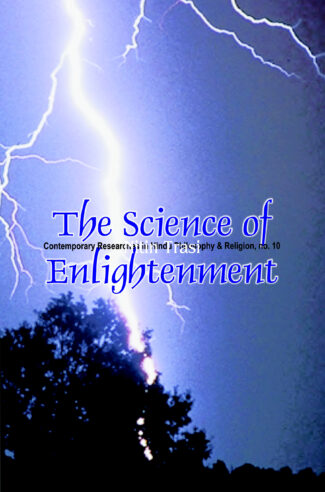
This work demystifies the entire subject of spirituality and the phenomena of Enlightenment and Liberation by demonstrating how they have a scientific basis and are definable in scientific/psychological terms.
What is the precise nature of Reality or God? And what exactly, in scientific terms, is the much-talked about spiritual phenomenon called Enlightenment? Is it at all scientifically possible for a state devoid of ego to exist? And can a person do his normal duties in life in such a state? This book answers these and kindred questions convincingly: in a way that should appeal to a scientist, a spiritualist and a lay person alike. Uncommonly combining in him the rationality of a medical scientist and the profundity of his religio-philosophical studies, the author demonstrates how the spiritual phenomena of Enlightenment and Liberation do have an eminently satisfactory scientific explanation an explanation which he also reconciles with conventional spiritual teachings. Finally, flitting adroitly from Advaita to Tao, Zen to Sufism, Buddhism to Christianity, Dr. Trasi shows how the teachings of different faiths arent different in essence, but just constitute intricate parts of the one and the same grand, big picture. With deep insight, forceful logic and supporting references, Dr. Trasis book not only dispels many of the myths, mis-conceptions and distortions woven around Enlightenment, the Liberated State, the Soul and Death, but explores the rationale behind wide-ranging traditional beliefs as well. Also set out is a scientific explanation of diverse spiritual terms. Nor is the practical aspect neglected here including, as it does, a scientifically-backed guide to offset the oft-recurring doubts and questions that nag the average spiritual enthusiast. Written lucidly, the book is bound to interest scientists, sceptics, and anyone else even remotely concerned with spirituality.

The book talks about the concept of consciousness, its incorporation in physical theories, presents the basics of Vedanta philosophy, theory of karma, man-machine interaction, the interaction of human being with physical world as per Vedantic philosophy, and interactions among human beings. It also points out the limitations of modern science in describing some aspects of human behaviour.
The volume is concerned with the concept of consciousness and its incorporation in physical theories. It tries to look for a unifying mechanism for fundamental processes taking place inside the human being which are responsible for all human actions and behaviour in outer world. It argues that the essences of life in conjunction with the consciousness can provide a viable framework for understanding the physical world as well as of human/non-human behaviour and its experiences.
The book presents the basics of Vedanta philosophy, comparing its viewpoint with that of objective science and other philosophies to throw light on classification of objects and inner and outer worlds and associated experiences. It studies the theory of karma, recapitulating the western view and views of modern science, and presents the Vedanta theory of karma. It takes up aspects like the role of the human being in a process with a discussion on the man-machine interaction; the interaction of the human being with the physical world within the framework of Vedanta philosophy; and the interactions among human and non-human beings. Several new concepts like dressing of essences of life with consciousness, principle of minimum efforts, a (3/2)-rule for the fragmentation of consciousness, a definition of mind set function and its evolution, K-effect etc. are introduced in the book for the first time. It repeatedly points out the limitations of modern science in describing some aspects of human behaviour.
The work will be useful to a broad spectrum of readers, particularly scholars and students, physicists, biologists, psychologists, professional philosophers, particularly philosophers of science.

The question of the relationship between the ultimate reality of the universe, and its proximate reality as experienced by us, is apt to boggle the mind. Nevertheless, the Hindu school of philosophy, known as Advaita Vedanta, tries to render it comprehensible at the level of the individual through everyday analogies like mistaking a piece of seashell for a piece of silver.
The question of the relationship between the ultimate reality of the universe, and its proximate reality as experienced by us, is apt to boggle the mind, given the vastness of the dimensions involved. The distinction between it and us is like the difference between an avalanche and a snowflake. Nevertheless, the Hindu school of philosophy, known as Advaita Vedanta, tries to render it comprehensible at the level of the individual by pressing everyday analogies into service. One such analogy is suggested by our experience in life when we momentarily mistake a piece of seashell for a piece of silver. Advaita Vedanta then proceeds to employ this pivotal analogy to explore the various dimensions of the relationship of the individual to the world, to the ultimate reality, and of the ultimate reality to the world. This book uses this metaphor as a window which opens out into the world of Advaita Vedanta.

The contributions in this volume deal with contemporary debates in Philosophy of Mind, Philosophy of Action and Moral Philosophy. Some of them relate these current debates to questions raised by ancient Greek and Indian philosophers regarding the nature of self-knowledge and moral agency.
Inquiry concerning the nature of self-knowledge has been one of the fundamental concerns of philosophy from its very inception. The enterprise of providing an adequate account of self-knowledge is closely related to questions regarding the role of humans as subjects of experience and as agents of actions. This collection of essays purports to address the problem of self-knowledge and agency by focusing on: a) the epistemological questions, and b) the relationship between the epistemological issues, and issues centering on agency and morality.
The contributions in this volume not only deal with contemporary debates in Philosophy of Mind, Philosophy of Action and Moral Philosophy, some of them relate these current debates to questions raised by ancient Greek and Indian philosophers regarding the nature of self-knowledge and moral agency.
A whole range of questions regarding the nature and status of first-person epistemology, its connection with questions concerning consciousness, intentionality, rationality, agency, personal identity, and morality are discussed in the twelve essays in this volume written by philosophers actively engaged in research in these areas. These essays provide accounts of the complex manner in which human beings understand and describe themselves as well as engage with the world.
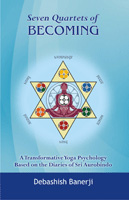
The book constellates Sri Aurobindo’s approach with transpersonal psychology, contemporary lineages of phenomenology, so as to develop a transformative Yoga psychology redefining the boundaries and possibilities of the human and opening up lines of self-practice towards a wholeness of being and becoming.
Groomed in a modern academic tradition and post-Enlightenment ideals of creative freedom and social critique, Sri Aurobindo (1872-1950) turned his attention to yoga and the limits of consciousness in its ability to relate to and transform nature. In the process, he documented scrupulously his experiments and experiences based on a synergistic existential framework of practice.
Debashish Banerji correlates the approach to yoga Sri Aurobindo took in his diaries with his later writings, to derive a description of human subjectivity and its powers. Banerji constellates Sri Aurobindo’s approach with transpersonal psychology and contemporary lineages of phenomenology and ontology, to develop a transformative yoga psychology redefining the boundaries and possibilities of the human and opening up lines of self-practice towards a wholeness of being and becoming.
Both scholar and Yogi, Aurobindo (1872-1950) carefully documented the unfolding of spiritual consciousness starting shortly after his deep revelatory experiences while in prison in 1908. His observations were recently published in a two volume set, The Record of Yoga. Debashish Banerji has analyzed this work and offers a detailed, clear, systematic and inspirational interpretation of how the Yoga of Sri Aurobindo may be understood and practiced.
Þ From the `Foreword’ of
Prof. Christopher Key Chapple
Doshi Professor of Indic and Comparative Theology Loyola Marymount University, Los Angeles, (USA)

The book constellates Sri Aurobindo’s approach with transpersonal psychology, contemporary lineages of phenomenology, so as to develop a transformative Yoga psychology redefining the boundaries and possibilities of the human and opening up lines of self-practice towards a wholeness of being and becoming.
Groomed in a modern academic tradition and post-Enlightenment ideals of creative freedom and social critique, Sri Aurobindo (1872-1950) turned his attention to yoga and the limits of consciousness in its ability to relate to and transform nature. In the process, he documented scrupulously his experiments and experiences based on a synergistic existential framework of practice.
Debashish Banerji correlates the approach to yoga Sri Aurobindo took in his diaries with his later writings, to derive a description of human subjectivity and its powers. Banerji constellates Sri Aurobindo’s approach with transpersonal psychology and contemporary lineages of phenomenology and ontology, to develop a transformative yoga psychology redefining the boundaries and possibilities of the human and opening up lines of self-practice towards a wholeness of being and becoming.
Both scholar and Yogi, Aurobindo (1872-1950) carefully documented the unfolding of spiritual consciousness starting shortly after his deep revelatory experiences while in prison in 1908. His observations were recently published in a two volume set, The Record of Yoga. Debashish Banerji has analyzed this work and offers a detailed, clear, systematic and inspirational interpretation of how the Yoga of Sri Aurobindo may be understood and practiced.
Þ From the `Foreword’ of
Prof. Christopher Key Chapple
Doshi Professor of Indic and Comparative Theology Loyola Marymount University, Los Angeles, (USA)
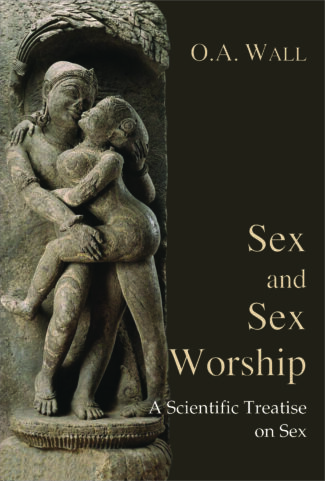
Mankind, when it gave expression to its first dawning of religious thoughts, wove a fabric of myths and theories about religion, the warp of which ran through from earliest historical times to our own days as threads of the warp of philosophies and theories about sex, male, female, love, passion, lust, desire, procreation, offspring, etc. The succeeding ages and civilizations wove into its warp the woof of the individual religions, myths and fables of gods and goddesses, so that the whole fabric of beliefs became refined as mankind itself advanced.
Sex and Sex Worship is the result of a long-time, arduous study of the concept of sex and the worship of phallus in various civilizations and in the development of different religions, modern and old, over a period of many millennia. The book makes one grasp a lot of topics associated with sex and sex symbols such as nature of sex and reproduction, status of women, cosmo-gonies, sex in man and animal, sexual relationship of gods and goddesses, virgin worship, phallic festivals, among many, while making it clear that the worship of generative organs was rather a use of representations of phallus and yoni as symbols for certain religious ideas which were embodied in nature worship.
It also vividly talks about the concept of sex and sex organs in art and ethics, sculpture, art anatomy, etc. The contents in toto lead one to the myriad aspects and concerns associated with sex and phallic worship. It is a must read for a scholar and a common man alike.
Mankind, when it gave expression to its first dawning of religious thoughts, wove a fabric of myths and theories about religion, the warp of which ran through from earliest historical times to our own days as threads of the warp of philosophies and theories about sex, male, female, love, passion, lust, desire, procreation, offspring, etc. The succeeding ages and civilizations wove into its warp the woof of the individual religions, myths and fables of gods and goddesses, so that the whole fabric of beliefs became refined as mankind itself advanced.
Sex and Sex Worship is the result of a long-time, arduous study of the concept of sex and the worship of phallus in various civilizations and in the development of different religions, modern and old, over a period of many millennia. The book makes one grasp a lot of topics associated with sex and sex symbols such as nature of sex and reproduction, status of women, cosmo-gonies, sex in man and animal, sexual relationship of gods and goddesses, virgin worship, phallic festivals, among many, while making it clear that the worship of generative organs was rather a use of representations of phallus and yoni as symbols for certain religious ideas which were embodied in nature worship.
It also vividly talks about the concept of sex and sex organs in art and ethics, sculpture, art anatomy, etc. The contents in toto lead one to the myriad aspects and concerns associated with sex and phallic worship. It is a must read for a scholar and a common man alike.

Mankind, when it gave expression to its first dawning of religious thoughts, wove a fabric of myths and theories about religion, the warp of which ran through from earliest historical times to our own days as threads of the warp of philosophies and theories about sex, male, female, love, passion, lust, desire, procreation, offspring, etc. The succeeding ages and civilizations wove into its warp the woof of the individual religions, myths and fables of gods and goddesses, so that the whole fabric of beliefs became refined as mankind itself advanced.
Sex and Sex Worship is the result of a long-time, arduous study of the concept of sex and the worship of phallus in various civilizations and in the development of different religions, modern and old, over a period of many millennia. The book makes one grasp a lot of topics associated with sex and sex symbols such as nature of sex and reproduction, status of women, cosmo-gonies, sex in man and animal, sexual relationship of gods and goddesses, virgin worship, phallic festivals, among many, while making it clear that the worship of generative organs was rather a use of representations of phallus and yoni as symbols for certain religious ideas which were embodied in nature worship.
It also vividly talks about the concept of sex and sex organs in art and ethics, sculpture, art anatomy, etc. The contents in toto lead one to the myriad aspects and concerns associated with sex and phallic worship. It is a must read for a scholar and a common man alike.
Mankind, when it gave expression to its first dawning of religious thoughts, wove a fabric of myths and theories about religion, the warp of which ran through from earliest historical times to our own days as threads of the warp of philosophies and theories about sex, male, female, love, passion, lust, desire, procreation, offspring, etc. The succeeding ages and civilizations wove into its warp the woof of the individual religions, myths and fables of gods and goddesses, so that the whole fabric of beliefs became refined as mankind itself advanced.
Sex and Sex Worship is the result of a long-time, arduous study of the concept of sex and the worship of phallus in various civilizations and in the development of different religions, modern and old, over a period of many millennia. The book makes one grasp a lot of topics associated with sex and sex symbols such as nature of sex and reproduction, status of women, cosmo-gonies, sex in man and animal, sexual relationship of gods and goddesses, virgin worship, phallic festivals, among many, while making it clear that the worship of generative organs was rather a use of representations of phallus and yoni as symbols for certain religious ideas which were embodied in nature worship.
It also vividly talks about the concept of sex and sex organs in art and ethics, sculpture, art anatomy, etc. The contents in toto lead one to the myriad aspects and concerns associated with sex and phallic worship. It is a must read for a scholar and a common man alike.

This book contains extensive commentaries on Narayana Guru’s five shorter philosophical poems The Science of the Absolute in Five Verses, Lamp of Non-duality, Consciousness, Chants for Oblations in Fire, and Ten Verses Addressed to God: A Universal Prayer. The poems elucidate the Vedàntic doctrine in terms of causality and the idea of Reality or atma being Consciousness in essential content.
The work collects Narayana Gurus most important shorter philosophic poems into one volume. They are respectively, the Brahmavidya Pancakam (Science of the Absolute), Advaita Dipika (Lamp of Non-Duality), Arivu (Consciousness Examined), Homa Mantram (Fire Oblation) and Daiva Dashakam (Ten Verses Addressing God). The verses are rendered into English and commented upon extensively by Swami Muni Narayana Prasad. Alongside the Gurus Atmopadesha Shatakam (One Hundred Verses of Self-Instruction) and the Darshana Mala (Garland of Visions), these poems are intended to transmit the wisdom of the Upanishads to the earnest seeker of the modern age. As a rishi of the modern age, Narayana Guru deals with issues pertinent today, including how social ethics and other contemporary problems are to be treated in light of the Absolute. As such, the Gurus poems may be said to be both ancient and modern at the same time.
Each poem contained in this book may be said to deal with a specific philosophical problem or a set of problems that may be encountered in the search for the Absolute. Each problem is consistently answered in light of the Absolute. Such elucidations include the prerequisites of both a true seeker and a true guru, the nature of the rapport to be established between each, and how the Absolute is sat, cit and ananda together. Other elucidations include the ultimate nature of Reality examined in terms of Consciousness, how Vedic ritual may be understood properly so that it may lead one to the highest realm of non-dual wisdom, and how to pray to God in the Absolutist sense.
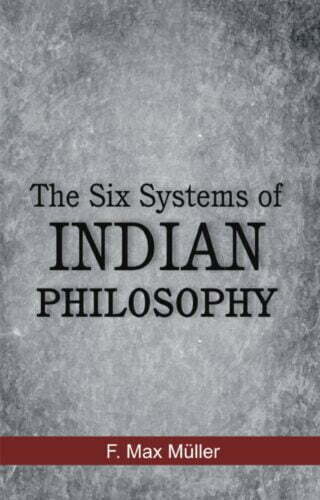
This volume addresses descriptively the key thoughts in Vedanta, Uttara-Mimamsa and Purva-Mimamsa, Samkhya, Yoga, Nyaya-Vaisheshika, and Vaisheshika systems. It reveals that Indian religion and the major philosophies of the land are well connected with the character of the inhabitants of India.
The Six Systems of Indian Philosophy by Friedrich Max Müller is a goldmine of comprehensive account of six major systems of Indian philosophical thought. It addresses descriptively the key thoughts in Vedanta, Uttara-Mimamsa and Purva-Mimamsa, Samkhya, Yoga, Nyaya-Vaisheshika, and Vaisheshika systems.
The book seriously focuses on one major finding that Indian religion and the major philosophies of the land are well connected with the character of the inhabitants of India. The originators of these six systems left no uncertainty as to the exact position which each of these philosophers occupied on the great battlefield of thought. Max Müller quite analytically approaches every system with full dedication and brings out the crux of all these thoughts. He revitalizes these systems and presents to the entire world the quintessentials of Indian thoughts.
This volume is also an effort to rejuvenate the lesser-known systems like Purva-Mimamsa, Nyaya, Vaisheshika and Yoga. This comprehensive volume should cater to the needs of all who operate in the domain of Indian philosophy.
“Dreams play a significant role in our life, meaningfully affecting us in the development of our personality and our spiritual journey. They are an everyday experience for any human being. Dreams have always been of great interest to poets and philosophers alike since ancient times and examples are aplenty in Indian and Western scriptures. However, it is an uphill task for an ordinary person to fully appreciate the intricacies and significance of dreams in the day-to-day life. It is here that this book proves as an invaluable guide providing deep understanding on the nature of dream and sleep.
This book is a repertoire of human wisdom – gathered for centuries and attested by the modern science – offering enormous insights into our dream and deep-sleep states. It asks, from a common man’s point of view, many a question that perturb us and provides answers to them from the scientific and spiritual perspectives in a captivating way. Some such questions include:
• Do we see dreams in black and white or in colour?
• What does a visually-challenged person see in his dreams?
• Why are some of our dreams extraordinarily vivid with electric colours, the clarity and brilliance of which, we may never encounter in our ordinary waking lives?
• Why are we non-reflective, irrational in our dreams?
• Are the dream time and waking time equal?
• How does our memory work in dream state? Why do we forget our dreams and is it possible to improve dream recall and cultivate awareness in dreams?
• Why do we fail to distinguish a dream object from the physical world object while we are dreaming?
• If the dream experience exactly feels like the real world and we fail to distinguish it from the waking world while we are dreaming, how can we be certain that we are not dreaming now?
• How does a dream contain various persons exhibiting opposite emotions at the same time when all the dream characters including the witnessing dreamer are produced out of single mind of the dreaming person?
• Can we intentionally transform the dream scenarios? If so, what would be the philosophical implications of it?
• Can dreams and sleeps be utilized for spiritual elevation?
… and many more questions we always wondered about the daily eight hours of our bed time, but never got the right answers to! We find new meanings and ways in dealing with our dreams in this volume, therefore, it is a must read for every dream enthusiast as well as any serious spiritual seeker.
“
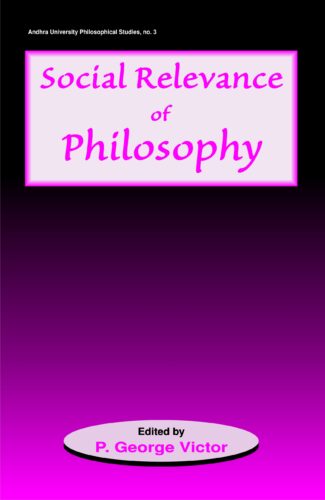
The essays study the relevance of philosophy at the social level, examining various philosophical systems. Considering the views of Indian and western thinkers including Thiruvalluvar and Gandhi, they take up contemporary concerns like dalit philosophy, philosophical counseling and tackling effects of consumerism.
What is the role of philosopher? Can philosophy be of any use to mans social living? These are some of the questions that the philosophy teachers try to answer in this book of twenty-two essays. It closely scrutinises the relevance of philosophy at the social level, throwing light on various philosophical systems and view of thinkers, both Indian and western. It shows how people can be guided on their many problems in a philosophical and holistic manner. Presented at a national seminar, the essays discuss a wide range of philosophical issues and perspectives on how man can modify his individual thinking, develop the spiritual dimension of life, transform his social conduct and manage personal and social relationships better. They deal with the relevance of Gandhis concept of freedom, the ethical importance of Tiruvalluvars philosophical outpourings, Buddhist perspectives on mindfulness and social reformation, and significance of Yoga for harmonious living. They take up contemporary concerns like reservations, dalit philosophy, growth of philosophical Counselling, ethical and bio-ethical dimensions of abortion, professional ethics, and role of philosophy in tackling the harmful effects of consumerism and materialism. This book will be extremely interesting for scholars of philosophy as well as general readers, and highly useful as a textbook in Applied Philosophy for students.
| There are no products |